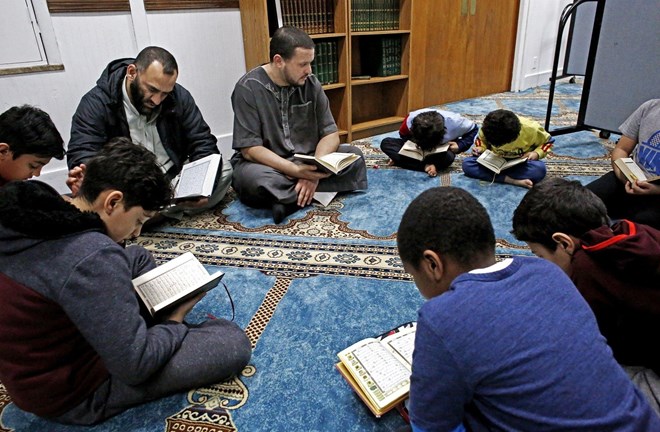When the Noor Islamic Cultural Center on the Northwest Side set out to find an imam, or religious leader, they weren’t looking for what many Muslims might think of as a traditional faith leader.
They wanted someone who could not only recite the Quran, or Muslim holy book, but also counsel congregants, work with the mosque’s young people and lead the community into the future.
“What we found was because there is a shortage of candidates who are qualified and appropriate for our size of community … we needed to be more aggressive about recruiting and go out and find somebody,” said Ronney Abaza, chair of the mosque’s board of directors and its imam search committee.
Noor searched for more than three years after its previous imam left for Cincinnati. Finally, on Wednesday, the mosque welcomed Abdel Moniem as its new religious leader. Moniem served most recently in Tampa, Florida.
For several years, leaders at mosques locally and around the country have pointed to a shortage of imams as they struggle to find qualified religious leaders who fit their expectations, said Ihsan Bagby, an associate professor of Islamic Studies at the University of Kentucky.
Bagby said the shortage isn’t caused by a lack of imams but a lack of the “type of imam that most mosques want, which is a homegrown, knowledgeable person who can work with Muslim youth of this country and also can do the kind of work within the public square and interfacing with interfaith partners.”
Although imams are plentiful overseas, Bagby said that American mosques have been unwilling more recently to look outside the United States because of concerns that the candidates won’t understand the local culture or possess the qualities that American Muslims are looking for in a leader.
“There is a (traditional) standard that is understood for an imam: that they can recite the Quran, have memorized much of the basic texts of the Quran, and are conversant in Islamic law. They are like a scholar,” Bagby said.
“The new imam is somebody who understands what it means to be a pastor, somebody who knows counseling, and somebody who can develop relationships with the youth.”
American mosques are in a race to catch up to these new expectations and the desire for American-born imams, Bagby said. Several U.S. institutions want to train imams but are just getting started, he said; imams have traditionally been trained overseas.
Bagby attributes these changing attitudes about what makes an ideal imam partly to second-generation Muslim immigrants who are reaching adulthood. Unlike their parents, they didn’t grow up with a traditionally trained imam from overseas who was mostly just a scholar, not a pastoral leader.
That difference might be why some Somali mosques in the Columbus area, which has the second-largest population of Somalis refugees and immigrants in the nation at around 55,000, aren’t having trouble finding a leader, and haven’t since they came to the United States. Most local Somali adults first-generation Americans who have experience with traditional imams in their home country.
Ibnu Taymiyah Masjid and Islamic Center on the Northeast Side has two imams and one person who trains young people to become religious leaders, said mosque director Ahmed Ahmed.
Many mosques without full-time religious leaders rely on volunteers who have some or all of the Quran memorized. For Ramadan, an important Muslim holiday when the entire Quran is recited, many mosques invite a visiting imam to preside over services because they don’t have a full-time imam, local mosque leaders said.
At Masjid Omar Ibn El-Khattab on the North Side, a member acts as the “unofficial imam,” said Ammar Awan, the mosque president. Mohamed Djebbari is the Quran teacher, but he also leads prayers when there, Awan said.
“Our Quran teacher, he’s actually qualified, so he’s able to talk and do counseling. He got the certificate to do weddings,” Awan said. “He’s capable enough to be an imam.”
Djebbari has acted for the past five years as the unofficial imam at the mosque, which has about 50 people who attend daily prayers.
Awan said the problem of hiring an imam has been twofold: There are shortages of qualified candidates and of funds to pay an imam.
Noor chose Moniem to lead its mosque because officials there saw he had vision and charisma, Abaza said.
“He has a big, big heart, and that was really one of the major things that attracted us to him,” Abaza said.
Moniem wanted to come to Columbus because he loved the diversity of Noor, Abaza said.
“It’s important to have an imam who’s lived long enough in the U.S. to understand culture and consider himself American,” he said. “Somebody who wants to contribute to (society) and improve it.”
By Danae King
![]()






























